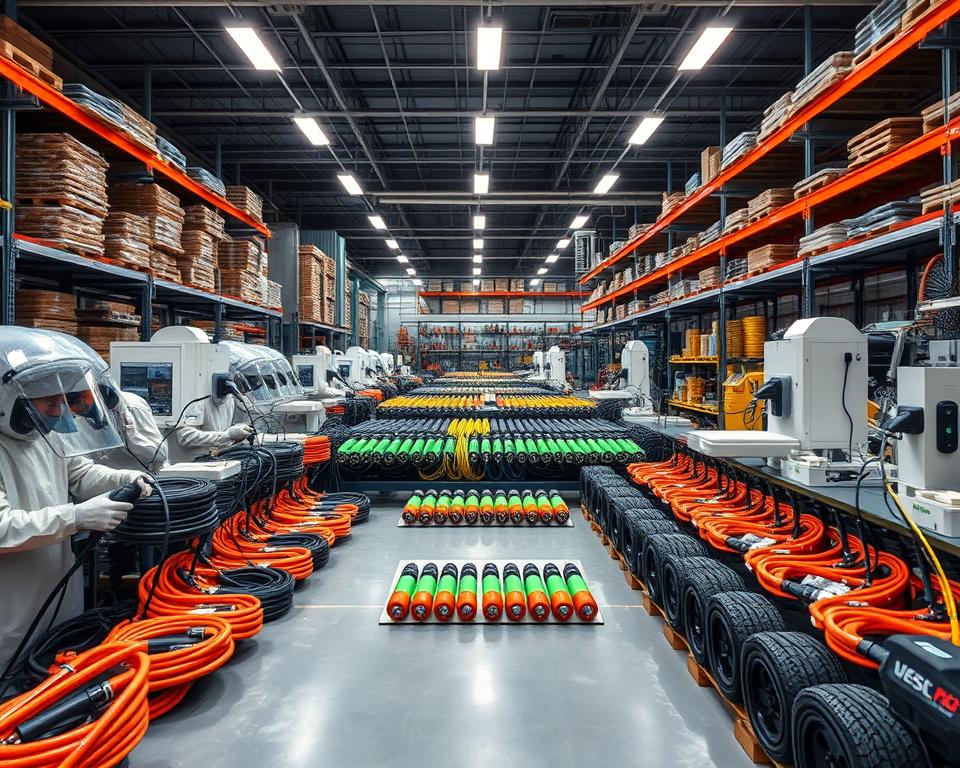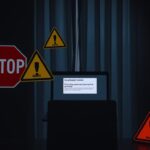Premier EV Charging Cable Manufacturers for Your Electric Vehicle
The electric vehicle industry is on the rise, with the demand for dependable and high-performance charging solutions growing exponentially. Currently, top brands have been at the vanguard of this change, providing premium charging infrastructure. Southwire, for instance, entered the market in 2014 and excels, boasting over 1000 five-star reviews and a 75-year legacy in electrical construction.
The surge in electric vehicle adoption necessitates the need for durable, quick, and safe EV Charger Manufacturers. Key suppliers are developing to meet these evolving needs, offering products that enhance the overall charging experience.
Understanding the distinctions between various charging solutions is crucial for making informed decisions. High-grade charging infrastructure directly impacts vehicle performance and user experience.
Main Points
- Key suppliers deliver top-tier cables enhancing lifespan and protection.
- EV market expansion drives need for high-efficiency chargers.
- Leading companies innovate to meet the evolving needs of electric vehicle owners.
- High-grade cables improve energy transfer and driving range.
- Investing in quality charging infrastructure is beneficial in the long run.

The Critical Role of Premium EV Charging Cables
As electric vehicles become increasingly popular, the value of premium EV charging cables cannot be overstated. The performance, safety, and dependability of electric vehicle charging systems rest on the quality of the charging cables used.
How EV Charging Tech Has Advanced
Charging tech for EVs has evolved rapidly, with a focus on speedy charge times and enhanced protections. Today’s EV charging cables are designed to meet these evolving needs, incorporating superior materials and construction techniques to minimize power loss and maximize transfer rates.
Why Quality Matters in EV Charging Infrastructure
Premium cables enhance both safety and functionality in EV systems. Durable features, such as weather resistance and flexibility in extreme temperatures, ensure reliable operation across various environments. Moreover, regulatory compliance and following protocols are essential in ensuring that cables meet rigorous safety requirements.
| Key Features | Benefits |
|---|---|
| High-grade build quality | Minimized power loss during energy transfer |
| Robust durability | Weather resistance, flexibility in extreme temperatures |
| Standards adherence | Rigorous safety requirements met |
| Maintainability | Repairable design for longevity |
Our high-performance cable solutions, such as those offered by Aichie Tech Electronics, are tested for quality and compliance in The Cable Lab. Choosing maintainable Portable EV Charger Manufacturer, users can save hundreds over a decade by choosing repairs over replacements, lowering environmental impact.
China’s Leading EV Cable Makers
China is home to a growing number of EV charging cable manufacturers. These companies are crucial in supporting the expanding electric vehicle (EV) market, providing high-quality automotive cables designed for various charging needs.
Wottz: Industry Leaders Since 2014
Wottz has established itself as a prominent player in the EV charging cable market since 2014. They offer a range of cables that cover Mode 1–4 charging standards, from Mode 1, 2, 3, and fast-charging Mode 4 DC Charging.
Aichie Tech Electronics: 75+ Years of Electrical Expertise
With over 75 years of experience in electrical solutions, Aichie Tech Electronics brings significant expertise to the EV charging cable market. Their products are built for residential and commercial applications.
More Leading EV Cable Brands
Specialists in Type 1/Type 2 connectors and environmental-resistant cables are emerging players. These include specialists in Type 1 (J1772) and Type 2 (Mennekes) connectors, as well as companies developing cables with enhanced flexibility and resistance to environmental factors.
Understanding Different Types of EV Charging Cables
As electric vehicles become increasingly popular, understanding the various types of EV Charging Cable Manufacturers is crucial for optimal charging experiences. Different cables suit different charging needs. The diversity in EV charging infrastructure demands a closer look at the different cable types available.
Comparing SAE J1772 and Mennekes Cables
SAE J1772 (Type 1) and Mennekes (Type 2) are the main global standards. Type 1, also known as SAE J1772, is predominantly used in North America, while Type 2, or Mennekes, is the standard in Europe. The choice between these cables depends on the vehicle’s connector type and the charging station’s compatibility. Type 2 cables often handle greater power, making them ideal for speed.
AC Level2 vs DC Fast Charging
Level 2 AC cables charge faster, up to 19.2 kW. DC Fast Charging cables, on the other hand, provide rapid charging by converting AC power to DC within the charging station, delivering rapid fill-ups. These cables are essential for long-distance EV travel, letting EVs charge in minutes.
Granny Chargers vs Tethered Units
Portable EV charging cables, such as “Granny chargers,” offer flexibility by allowing owners to charge their vehicles from standard household outlets. Tethered cables are fixed to charging stations, offering ease at the cost of portability. The choice comes down to flexibility vs convenience.
Cable length, power rating, and connector type matter most. For instance, portable charging cables range from simple L1 cords to full L2 kits. Vehicle-to-load (V2L) cables let EVs act as mobile power banks.
- Portable charging cables offer flexibility, with options ranging from basic to more robust Level2 solutions.
- Fixed cables add convenience, removing cable management tasks.
- Lengths vary from 5 m to 50 m—choose wisely.
Essential EV Cable Characteristics
Premium cables stand out for durability, safety, and performance. These features are crucial for maintaining the integrity of the charging process and safeguarding the vehicle and user.
Durability and Weather Resistance
Cables must withstand rain, sun, and cold. Manufacturers like Wottz and Southwire use RoHS-compliant recyclable compounds, ensuring they perform in harsh climates. Their serviceable design facilitates easy maintenance and promotes recycling.
Maneuverability and Convenience
Flexibility and ease of use are also critical factors. High-quality EV charging cables are built for easy handling without sacrificing strength. This flexibility does not compromise their durability, as they are built to withstand regular use.
Certified Safety and Standards
Safety certifications and compliance with international standards are non-negotiable for reputable EV charging cable manufacturers. They ensure their products meet or exceed standards such as IEC62196 for connectors and UL2594 in North America. Rigorous third-party testing evaluates electrical safety, mechanical durability, and environmental resistance.
| Certification | Description | Region |
|---|---|---|
| IEC62196 | Connector safety standards | International |
| UL2594 | Standard for electric vehicle supply equipment | North America |
| ROHS | Restriction of hazardous substances | International |
By focusing on these key features, manufacturers can provide EV charging cables that not only meet the highest quality and safety standards but also enhance the overall user experience.
Next-Gen Charging Cable Tech
The latest developments in EV charging cable technology are revolutionizing the way we charge our vehicles, with a focus on ultra-fast charging, improved signal integrity, and eco-friendly materials.
Liquid Cooling for Rapid EV Charging
Liquid-cooled charging cables are emerging as a key technology for ultra-fast charging, enabling electric vehicles to charge at significantly higher speeds without overheating.
Signal-Boosting Contact Designs
Hyperboloid contacts are being integrated into EV charging cables to enhance signal integrity, ensuring reliable and efficient data transfer during the charging process.
Sustainable and Recyclable Materials
Leading manufacturers are prioritizing sustainability in their cable designs, using recyclable materials and eco-friendly compounds that reduce environmental impact. For instance, companies like Aichie Tech Electronics and Wottz are embracing repairable designs and strict standards to foster reuse.
Programs for cable recycling, non-toxic compounds, and TPU sheaths mark the eco shift.
Choosing the Perfect EV Cable
Selecting the proper cable ensures optimal performance. To make an informed decision, consider several key factors.
Connector Compatibility
Ensure the charging cable is compatible with your vehicle’s connector type. Your vehicle’s onboard charger capacity determines the maximum AC charging rate it can accept.
Determining the Optimal Cable Length
Select a cord length based on parking and outlet location. A longer cable provides more flexibility but may be heavier and less manageable.
Matching Power and Speed
Match your cable’s power handling to your vehicle’s capabilities. Standard Level 2 home charging operates at 7.2 kW, but some vehicles support up to 19.2 kW with appropriate electrical service.
Mind these points to pick a cable that fits your EV lifestyle.
Final Thoughts on Premium EV Cables
As the electric vehicle market continues to expand, the importance of quality charging infrastructure cannot be overstated. Investing in premium EV charging cables from established manufacturers like Wottz and Aichie Tech Electronics ensures superior durability and lower lifetime costs. Their serviceable designs enable repairs over replacements to cut waste. This approach supports eco-friendly EV use.
Premium cables offer certification, future proofing, and reliability.


